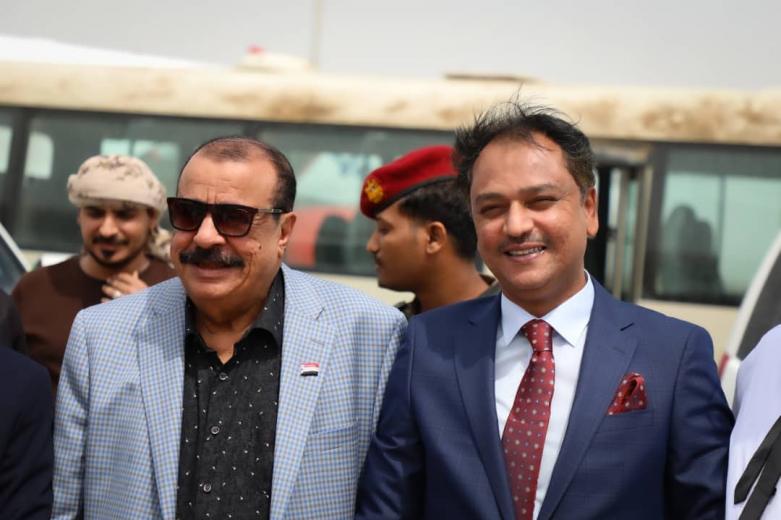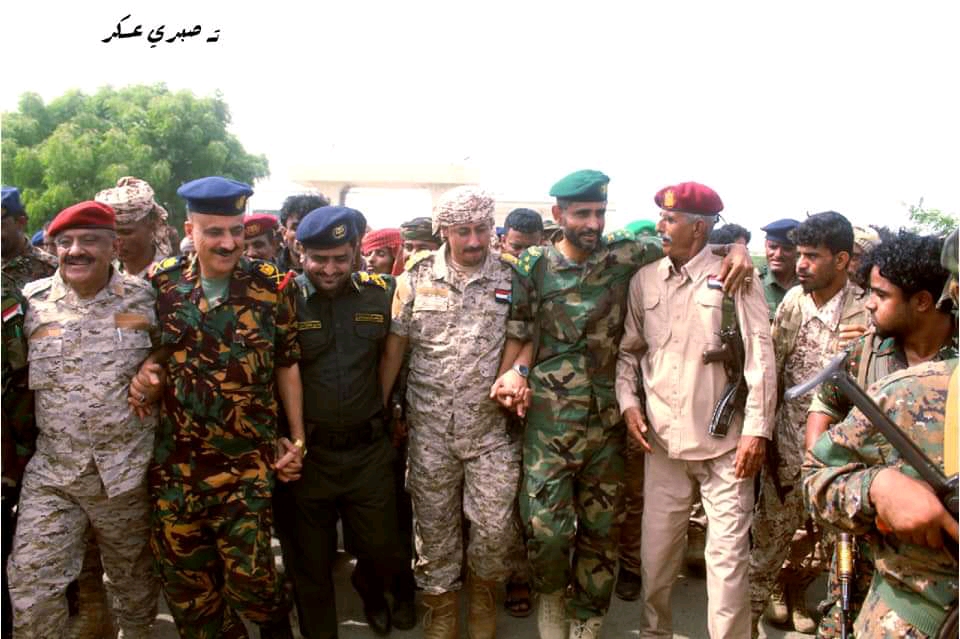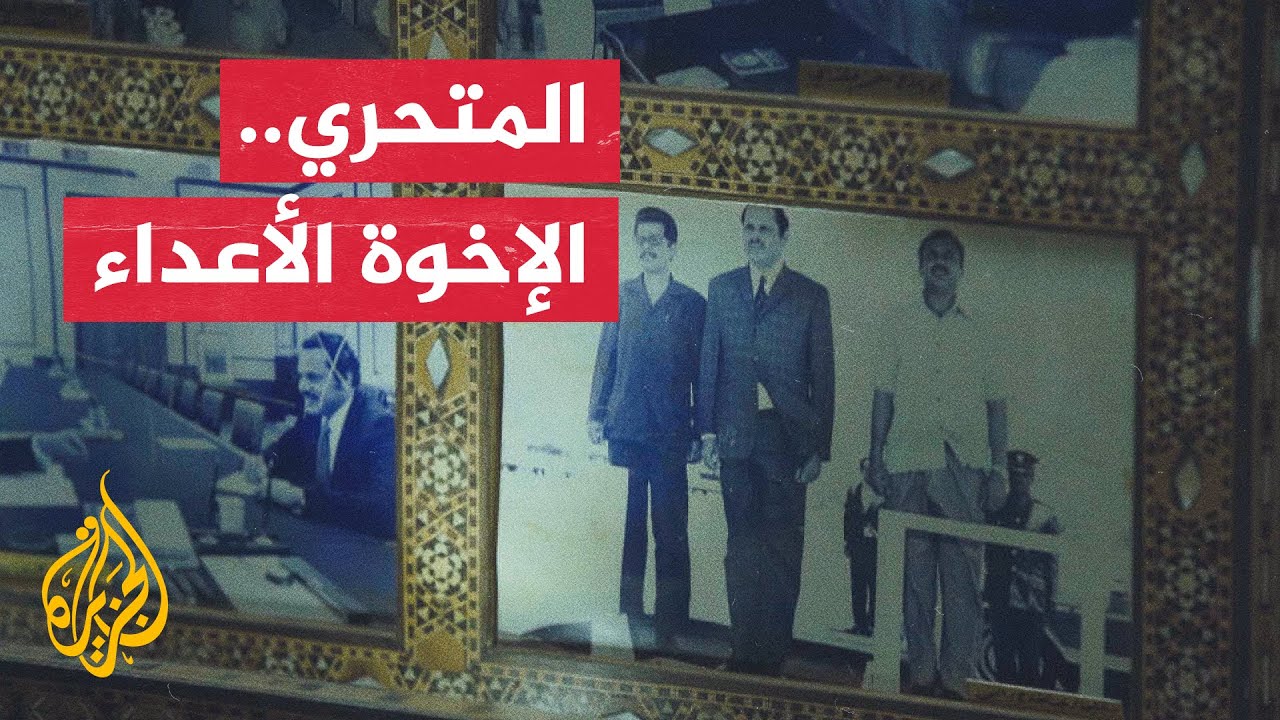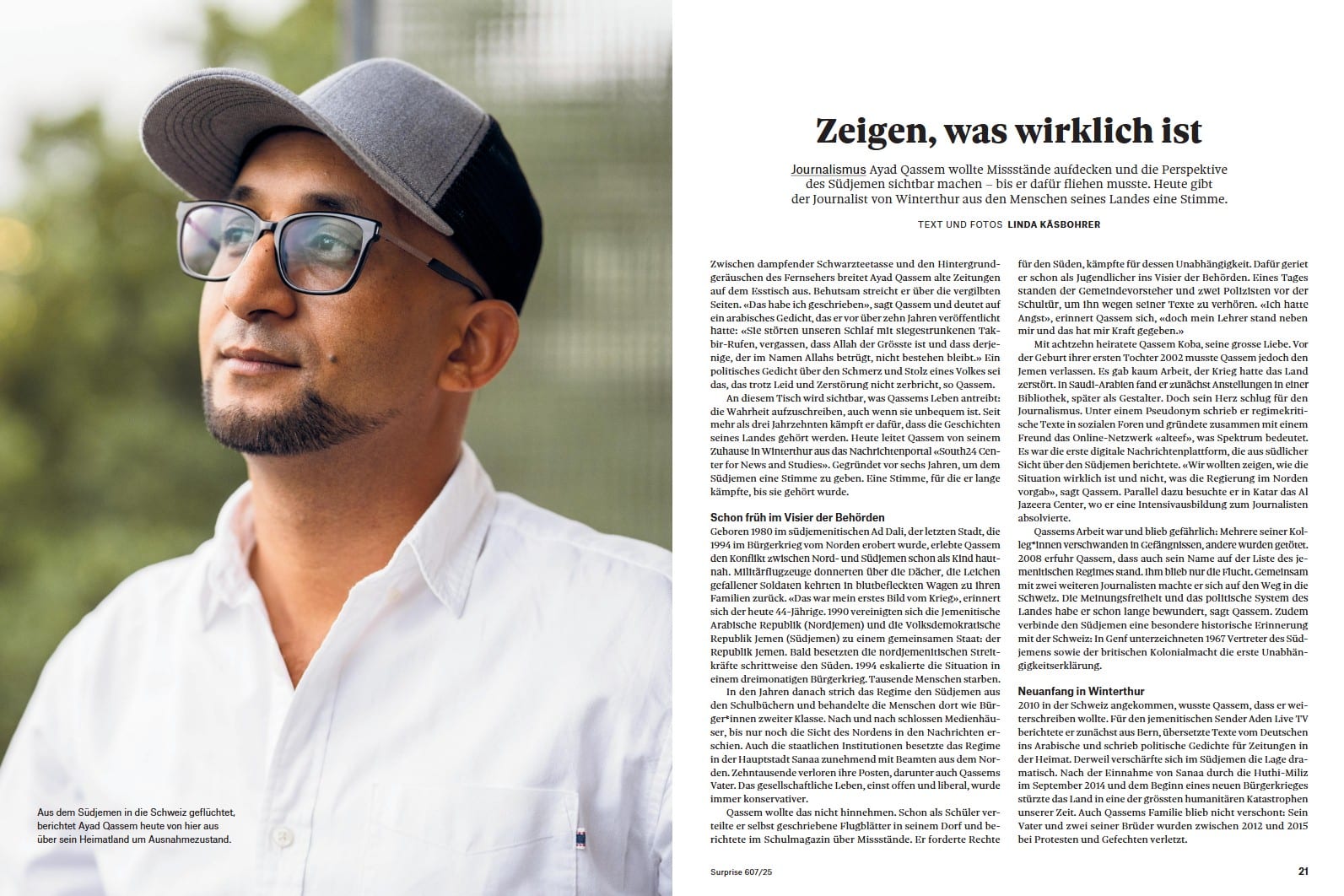
Fadi Baoum and the STC National Assembly Speaker Ahmed Bin Break (official)
آخر تحديث في: 04-09-2022 الساعة 5 مساءً بتوقيت عدن
Abdullah Al-Shadli (South24)
On June 29th 2021, the STC announced the establishment of the "External Dialogue Committee" It includes a number of Southern figures in diaspora to engage in dialogues with various Southern components and communicate with figures who are not affiliated with the STC to achieve rapprochement and alignment.
After more than one year of continuous work and dozens of meetings in Arab and European capitals with Southern entities and figures, these efforts succeeded in reaching some understandings that led to the return of prominent Southern leaders to Aden such as the head of the Political Bureau of the Revolutionary Movement (Hirak) Fadi Baoum who arrived at the governorate on August 31th.
The Southern rapprochement has not been limited to the entities and officials abroad as the STC managed to reach important understandings with military forces within Abyan. This led to the end of years of hostility in the governorate which is located east of Aden.
This Southern rapprochement came in conjunction with important political and military changes in the Yemeni arena, foremost of which was the STC’s participation in the newly-formed PLC which leads the country from Aden. Moreover, this includes the control held by Southern forces on Shabwa which is rich in natural resources.
However, there are many external and internal Southern entities and figures with whom the STC need to communicate with and reach understanding to align with its institutions and bases in Aden and South. This pushed the STC President, Aidrous Al-Zubaidi to issue a decision to establish two teams for the Southern dialogue.
The decision, issued on August 27th, stipulated on forming the External Dialogue Team led by the prominent Southern figure who stays in Europe, Ahmed bin Fareed and It is derived from the previous team. Additionally, the decision included the establishment of the Internal Dialogue Committee led by Saleh Mohsen Al-Haj.
Rapprochement and cohesion
In conjunction with the arrival of the leadership of the Political Bureau of the Revolutionary Movement to Aden, the Southern forces announced launching operation “Eastern Arrows” in Abyan which aims to target the terrorist groups.
In just a matter of hours, the Southern forces entered the coastal city of Shuqra with coordination with the Abyan Axis Forces which were at odds with the STC.
Over the subsequent days, the Southern forces took command over areas, camps and locations in Abyan’s central districts while the governorate’s police commanders returned to its main headquarters in the city of Zinjibar, the governorate’s capital which was under the control of the Security Belt Forces.
Although these arrangements came to implement the military aspect of the Riyadh Agreement, they represent significant progress for the Southerners in the path of rapprochement and cohesion between the STC and other civilian and military components.
As for the thaw in the hostility, Brigadier General Ali Al-Kazemi, Abyan's Security Director told "South24": "We pin our hopes on the end of the disputes and that the Southerners learnt the lesson they failed to understand in previous stages".
The official, who led one of Aden's resistance fronts in 2015 added: "We saw the reality. Personally, I learnt the lessons and I hope that others do the same".
Al-Kazemi talked about the latest arrangements and understandings with the forces affiliated with the STC. He described this as a "semi-miracle". He added: "There was big cooperation between us which produced a deal that ended the three-year non-stop fighting".
He added: "We didn't look at things from its political side but as a complete security system including a security body and a security belt. Not a single shot was fired during the implementation of these arrangements. This deserves to be a lesson inherited by successive generations".
Al-Kazemi said: "there is a brotherly relationship between us and the STC and it has nothing to do with the political affairs". He added: "Soon we will return to Aden, my second hometown where bloodshed has been more than Abyan".

Southern commanders in Abyan's Zinjibar (Sabri Askar)
Regarding Fadi Baoum's return and his leadership of the Revolutionary Movement's Political Bureau in Aden, Marawan Ali Al-Hamomi, Member of the STC's National Assembly who played a prominent role in achieving consensus had said: "Over the past period, the communication channels with the Revolutionary Movement continued".
He told "South24": "We disagreed on some simple parts. Some disputes used to be affected by the changes of every stage but we managed to achieve the understanding which has tangible results today".
Al-Hamomi noted that "this helped much to build trust among the parties". He indicated that the STC’s slogan is “Whoever does not come to us, we will go to him". He pointed out that "such a rapprochement does not mean abolishing the credits of certain symbols or components. Everyone has done his best and provided what he can".
For his part, Dr. Mohammed Abdulhadi, the Head of the Political Committee of the Supreme Council of the Revolutionary Movement (an independent entity) told "South24": "All of us are looking forward to the Southern rapprochement and cohesion as well as leapfrogging all the past negative traces".
He added: "This can't be achieved without an honest and transparent dialogue that leads to real understandings and full coordination with the STC and other Southern components. There should be real exchanging roles and to seriously look at issues and challenges"
The STC's committees
Regarding the role of the External Southern Dialogue Team during the past period, its member Adel Al-Shabhi told "South24" that "since its establishment, the team has been able to communicate with most Southern components and forces, whether political or social, in addition to the figures and leaders".
He added: "We have been keen to communicate with those who personally oppose the idea of the dialogue. We can say that the stance of all forces towards the dialogue invitation was a positive one".
"The Southern forces showed their keenness and responsibility towards this task and the importance of unifying the Southern ranks as well as the Southern participation in the incoming phase regardless of its disagreements with the STC," he added.
Al-Shabhi spoke about the meetings held by the committee since last year. He said: "We held more than 50 meetings during one month only last year with Southern components and figures".
He added: "We moved to Riyadh in conjunction with the consultations without excluding anyone. Then, we moved to Jeddah where we met important figures in the political, social and economic fields".
In an interview with "South24", Abdulnasser Al-Jaari, a member of the newly-formed "Internal Dialogue Team'' said: "We have been tasked with making dialogues with all components. There are ongoing efforts that have positive indicators".
He indicated that "the committee's tasks come as an extension to the tasks and the understandings of the previous committee and stage". He added: "We are ready for a dialogue with all the Southern forces without excluding anyone. We have no reservations about any Southern figure or entity".
Joint points
Basically, restoring the independent Southern state constitutes the common ground which supports the rapprochement between STC and other components which have a joint history with the STC's leadership in the peaceful Southern Movement (Hirak) in 2007.
The STC include most Southern liberation figures and entities while there are still other components which are not affiliated with it. The latter seeks for rapprochement with them through committees and the dialogue teams affiliated with it".
Regarding the joint points upon which the dialogue teams affiliated with the STC depend for convincing and understanding, Al-Shabhi said: "South Yemen is a general issue. It is a country that everyone believes in. There are many issues which gather us with all Southern forces as brothers".
He added: "It is true that points of view may differ but we always agree on the importance to defend South, restore the Southern state, unifying ranks and establishing a joint team to speak on behalf of the Southern issue abroad".
He added: "This is important, especially that we approach a peace process ratified by the international community and we are part of this political operation. The sovereignty is acknowledged by the Riyadh Consultations as a special framework for the Southern issue".
Abdulhadi admitted that there are Southern components and forces which lack the same amount of enthusiasm for the sovereignty of South Yemen as an independent state.
He said: "There are entities which have other projects such as the federal state, the regions or others. Our goal is to restore South Yemen, land and humans, with the same pre-1994 borders".
On the relationships between the Supreme Council of the Revolutionary Movement and STC, Dr. Abdulhadi said: "Our relationship is good. We began the dialogue consultations when the STC established the committee. We were the first who welcomed the dialogue".
Al-Shabhi pointed to a meeting between the STC's leadership and Southern figures which are not classified as part of the Southern Movement that called for the independence of South Yemen.
He said: "intensified meetings were held between President Aidrous Al-Zubaidi and the head of National Southern Coalition, Sheikh Ahmed Al-Essi. Al-Zubaidi expressed much keenness in these meetings. We work with direct instructions from him in this field".
Preaching the Southern alignment
On Jan 13th 2006, Radfan, which is located in the Southern governorate of Lahj witnessed a big "million-demonstrator rally" under the title "a million rally for reconciliation and forgiveness".
This served as a defining moment in the history and the strife of the Southerners as well as turning the past pages that witnessed political fighting in the Southern state three decades ago.
Although the Southern reconciliation and forgiveness, which was transformed into a well-established national principle- was concluded by launching the peaceful Southern Hirak, the Southerners were subjected to the attempt to revive the past, arouse division and break the ranks from their rivals, especially the former regime which governed Yemen.
Over past years, Northern media outlets [the Houthis and Islah party] often produce photographed and written materials as well as hosting figures to talk about the political conflicts in South Yemen.
On August 19th, the Qatari-owned Al-Jazeera broadcast an episode under the title "the Enemy Brothers' about the political conflict among the wings of the Yemeni Socialist Party which ruled South Yemen on Jan 13th 1986. The episode which was divided into two parts as part of "Al-Motahari" program, which is prepared by the Northern journalist Gamal Al-Moliky, infuriated the Southerners as it contained parts from the Aden Channel's archive which was likely stolen previously.

"The Enemy Brothers" an episode from "Al-Motahari" program on Al-Jazeera.
Regarding what was broadcast by Al-Jazeera, Al-Kazemi said: "Today in South Yemen, we don't care about what happened in the past. We have to look forward and to the future".
Dr. Abdulhadi criticized the Qatari-owned channel which supports the Muslim Brotherhood. He added: "It is important to benefit from the past to build a better future".
With the establishment of two internal and external dialogue teams, the next period may witness more Southern rapprochement in an important stage and a sensitive turning point in the path of these people.

قبل 3 أشهر

قبل 3 أشهر